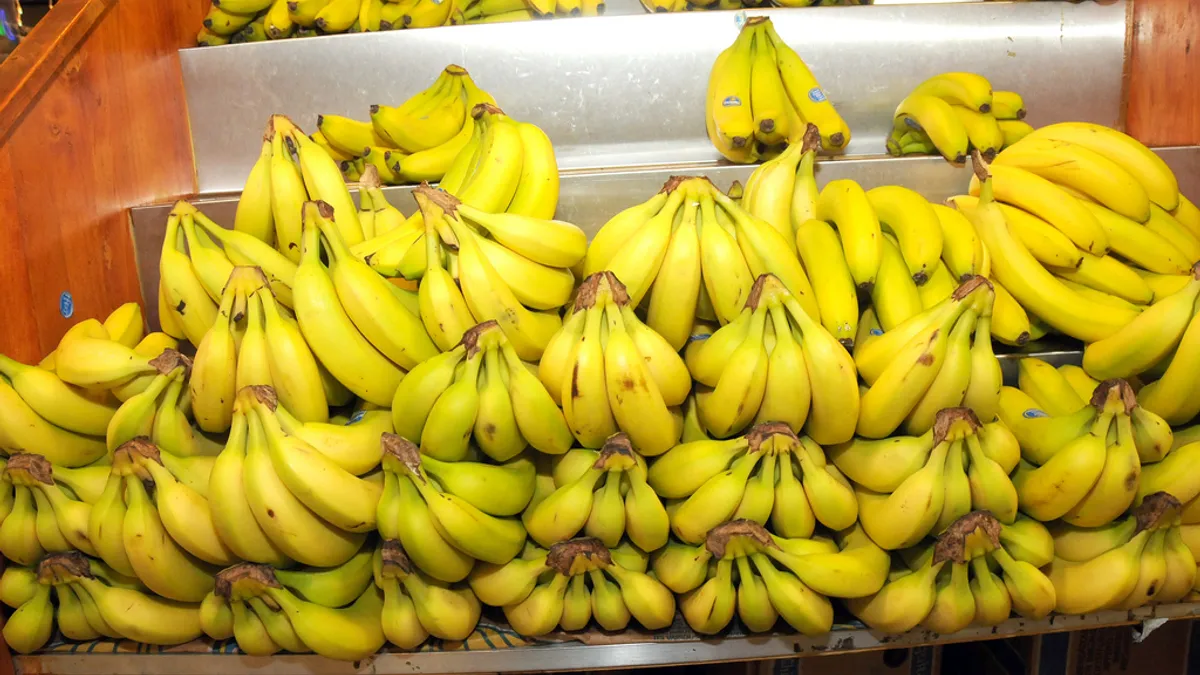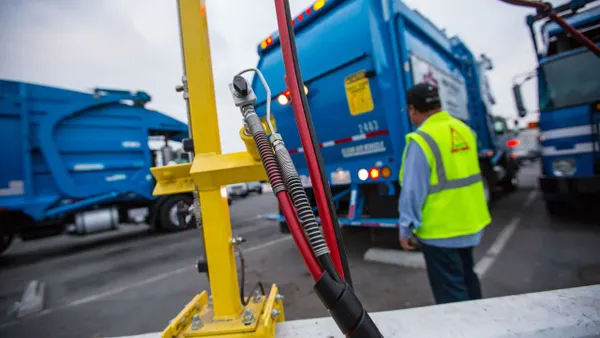Dive Brief:
- Korean grocery store E-mart has developed a "One a Day Banana" packaged solution that arranges several bananas according to ripeness, according to Time.
- The goal is for consumers to eat a perfectly ripe banana each day without the risk of selections going brown — a move meant to boost consumption and also reduce food waste.
- This lifestyle hack comes on the heels of a new study from Sweden that found the country's most wasted supermarket food item is the banana. The Swedish study also discovered that bananas generate the most food waste not only in terms of weight volume, but also environmental impact.
Dive Insight:
About 75% of consumers purchase bananas, making them the clear favorite among American consumers. But they're also the most likely fruit to end up in the trash, disproportionately contributing to a very large food waste problem in the U.S. This Korean hack provides consumers with the short life cycle of a banana bunch — from green to fully ripe — without the risk of the entire bunch browning all at once or prior to consumption.
This produce-saving hack is similar to Trader Joe’s "Teeny Tiny Avocado" bags launched last year as "just the right size" choices. This launch was lauded by many for its waste-saving potential.
Genius at work. E-mart in Korea is now selling the "One a Day Banana" pack, containing several bananas of different ripeness so that you can eat them over several days. https://t.co/VWEkSsE1my pic.twitter.com/V2uLRLKpwL
— T.K. of AAK! (@AskAKorean) August 6, 2018
Other retailers are also embracing waste-saving solutions, especially those focused on produce, as fruits and vegetables and mixed fruit and vegetable dishes account for 39% of food waste, according to the U.S. Department of Agriculture. Hy-Vee, for example, last year added Robinson Fresh’s Misfits produce line — one of several so-called "ugly" produce ventures — in most of its 242 retail stores.
It's not hard to imagine other produce hacks that find new uses for produce that's typically hard to move or considered unsalable. Over-ripe bananas could go in a special display that bundles together all the ingredients needed to make banana bread. Grocers could also separate produce selections according to ripeness. Avocados, for instance, could go in separate "ready today" and "ready this week" bins.
In addition, there are some promising technology innovations that could help in the fight against waste. Several solutions have hit the market to help consumers identify spoilage, remind shoppers of date labels and help with meal planning.
There's also the promise of Apeel Sciences, which develops invisible plant-based edible skin aimed at extending the shelf-life of fruits and vegetables, including avocado, citrus, berries and more. The company recently raised $70 million in funding but has not disclosed plans to tackle the banana issue.
On paper, these solutions make plenty of sense. But there is a big question mark as to whether or not the banana idea specifically could translate to the U.S. because it requires additional packaging. At a time when restaurants, hotels and airlines are removing plastic straws from their systems to save on waste, adding more packaging to solve a food waste problem seems contradictory.
But at this point in time, any approach should be welcomed. Americans throw away approximately 150,000 tons of food a day, according to data compiled by the U.S. Department of Agriculture. This translates to about 26% of food wasted by U.S. consumers from 2007-2014.











